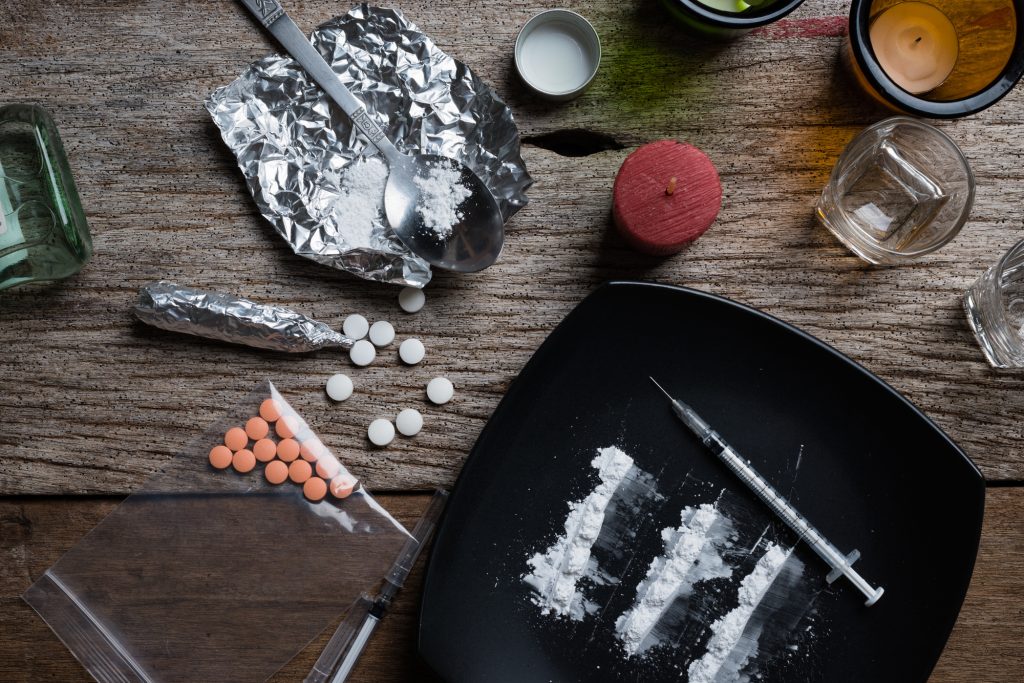Learn the Most Addictive Drugs
A government report showed that about 64,000 people died due to drug overdoses in 2016.
Drug abuse has led to several adverse implications among young and older adults.
Other than death, addiction to drugs can alter your brain chemistry and cause financial, legal, and health issues.
The side effects of drug abuse are not new to users. In fact, many have tried to ditch drug abuse to no avail.
Most of the abused drugs lead to addiction, making it harder for users to survive without them.
The extent of addiction to drugs varies. Here’s a comprehensive list of seven of the most addictive drugs that you need to know.

1. Heroin
If you didn’t know what the most addictive drug in the world is, there you have it.
Heroin ranks as the most addictive substance, scoring 3 out of the maximum, three. Heroin is derived from opium poppy extracts.
Heroin is an opiate, mostly sold as a brownish or whitish powder. Users commonly smoke, swallow, or inject heroin into the veins.
The drug increases dopamine levels when taken. The activated opioids receptors produce a good-feeling sensation, relaxation, and blocks pain.
Users get into a dreamy state when heroin’s euphoric effects subside.
Heroin has extreme withdrawal symptoms, which make users continue using the drug.
Some of the withdrawal symptoms include diarrhea, vomiting, cold flashes, severe bone and muscle pain, uncontrollable movements, and restlessness.
Despite ranking as the most addictive, heroin is reported to be the second most dangerous drug due to the damage it has on society and the individual.
If you’re recovering from heroin addiction, you need to know how to stay away from common relapse triggers. Once you identify these relapse triggers, remaining sober won’t be such a struggle.
24 Hour Drug Rehab Hotline – Get Help Now
877-651-3366
2. Cocaine
When listing the most addictive drugs, cocaine is almost in the same category as heroin. Up to 14,000 Americans succumbed to cocaine overdose in 2017.
This was a 34% increase from the previous year. Clearly, cocaine’s popularity has been increasing in recent years.
Cocaine is a white crystal powder. Users inject, smoke, or rub the powder on their gums.
Crack cocaine has slight differences from the regular cocaine; it has a high potent nature, making one feel the effect more quickly than the typical variant.
Using cocaine gives users an intense euphoric feeling. The drug triggers the brain to produce dopamine, which makes one feel high.
With constant use, the body becomes tolerant of cocaine, and one has to increase the dose to achieve the desired excitement, happiness, and high energy.
As the drug continues to wear off, users experience anxiety, anger, and depression.
As a resultant, users become dependent on the drug. Continued snorting of cocaine can lead to a constant runny nose, swallowing difficulties, nosebleeds, and loss of smell.
3. Nicotine
The use of tobacco involves chewing, sniffing, and smoking products that have nicotine. Tobacco products that contain nicotine include cigars, cigarettes, bidis, and hookah products.
A significant number of teenagers and adults smoke these products.
Administering nicotine in the body leads to the release of endorphins.
While the surge is incomparable to other drugs, increased use raises dopamine levels in the user’s body. Long-term exposure to nicotine prompts the brain to seek more of this drug.
Nicotine is amongst the addictive drugs that kill. It narrows the arteries and hardens the arterial walls, which can lead to a heart attack.
Besides the cardiovascular effects, nicotine increases the risk of gastrointestinal and respiratory conditions.
When one tries to quit smoking, withdrawal symptoms such as headaches, mood swings, and anxiety can be a hindrance.
The symptoms are severe, and users often relapse. Besides, nicotine products are easily accessible, which makes their addiction common.
Immediate Placement Alcohol Rehab – Get Help Now
877-651-3366
4. Alcohol
Global alcohol consumption per capita is projected to increase by 17% within the next decade.
Despite the rising cases of alcohol-related disorders, more adults are taking alcohol without flinching. Alcohol is in the category of the most addictive drugs, not only in the US but also globally.
The use of alcohol in a social setting makes it seem less harmful as compared to other hard drugs.
Yet, it increases the risk of liver diseases, cancers, and cardiovascular disorders. Alcohol alters one’s judgment, which prompts users to engage in risky behaviors such as explicit sex and drunk driving.
Consumption of alcohol increases dopamine levels, which gets users excited. However, continued use ultimately leads to dependence.
The extreme withdrawal systems such as severe headaches make alcoholics to fall back.
If you’ve been experiencing withdrawal symptoms or can’t go a day without alcohol, it’s probably time to go to rehab.
The willpower to check into rehab isn’t always present. But if you have several troubling signs, going to rehab will give you better control of your life.

5. Methamphetamine
Methamphetamine is one of the highly addictive psycho-stimulant drugs. Despite being illegal, thousands of people use it for the euphoric effects. Meth raises the levels of norepinephrine and dopamine in the brain.
Meth users inject, ingest, snort, or smoke this illegal drug. The intense rush and euphoric high can last up to 24 hours. The effects of meth last more than cocaine.
Methamphetamine can be made using available ingredients, which means it’s cheaper. Some of the street names for this drug include crystal, chalk, ice, speed, and rank.
Meth has high neuro-toxicity, which can have damaging effects on the serotonin and dopamine neurons in a user’s brain.
This toxicity further increases when a person combines the drug with opiates, cocaine, and alcohol. Regular use of methamphetamine might lead to irreversible functional and structural changes in the body.
When you follow the steps to overcome addiction, you can be free from this highly addictive drug. However, it is essential to acknowledge that meth addiction is one of the most difficult drug addictions to treat.
Support from family and friends can go a long way in the process of recovery.
24/7 Rehab Hotline – Get Help Now
877-651-3366
6. Barbiturates
Barbiturates are in a category of drugs referred to as sedative-hypnotics. While the drug is typically in the form of a pill, users inject it in its liquid form.
These drugs were initially used to decrease anxiety and induce sleep in the 1960s.
However, an incorrect dosage can be dangerous. In extreme cases, overdosing on barbiturates can cause death or coma.
When used minimally, the drug can cause euphoria. Barbiturates are highly addictive.
Fortunately, these drugs are rare, unlike in the past. Doctors have replaced the prescriptions with benzodiazepines, which play the same sedative-hypnotic role. The latter is safer than barbiturates.
Continued use of barbiturates can cause tolerance development. Abuse of this drug might lead to an overdose. A coma, dilated pupils, shallow breathing, and clammy skin are some of the overdose signs you need to observe.
Discontinuing barbiturates exposes a person to a myriad of side effects.
Some of the notable withdrawal symptoms include insomnia, anxiety, dizziness, psychosis, and seizures. If untreated, barbiturates lead to circulatory failure, hypothermia, and death.
7. Methadone
Methadone is under the category of opioids. When analyzing some of the most addictive drugs, opiates rank first in this category.
This drug has been highly effective in treating extreme pain.
Besides, some doctors use it to treat heroin addiction. You can take methadone as a liquid, powder, or tablet.
While doctors prescribe this methadone in some cases, people still take it illegally by injection.
Constant use of this drug can cause addiction. Some of the side effects of methadone include hallucinations, light headedness, breathing difficulties, and chest pains.
Your body might adapt to the calming effects of methadone. When you get to the drug tolerance stage, addiction might be imminent.
It is advisable to seek medical help if you find yourself taking more methadone than what’s recommended.
8. Cannabis
Cannabis, also known as weed or marijuana, is another common addictive drug.
This drug is a mixture of dried stems, leaves, and flowers of the Cannabis Sativa plant. People using cannabis smoke it via a pipe or as a cigarette.
Weed induces the central nervous system, leading to the production of sensations such as mild euphoria, wrong perception of time and space, relaxation, and increased appetite. Cannabis is addictive. Yet, eleven states have legalized its recreational use.
One of the behavioral symptoms of cannabis includes losing interest in activities that you previously enjoyed. Withdrawal from friends and secrecy are other signs of cannabis addiction.
Declining performance at work and school can also result from consistent use of weed.
Cannabis addiction leads to physical symptoms such as dry mouth, bloodshot eyes, poor coordination, fatigue, and lack of attention.
Free Insurance Verification for Rehab – Get Help Now
877-651-3366
Most Addictive Drugs Have Several Withdrawal Symptoms
Drug users trying to reform often face extreme withdrawal symptoms.
With such relapses, doing away with most addictive drugs isn’t usually easy.
If you have a friend or family member who’s deep in addiction, supporting them can help a great deal.
It would be best to walk with such people through rehab so that they can transform.
Some of the long term implications of these drugs are fatal. Rehabilitation can save a soul.
Do you need an addiction counselor?
Contact us today.
Our team of qualified medical staff will walk with you or your loved one until you recover.
